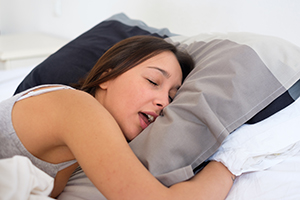Breathe Better and Sleep Well with Expert Sleep Apnea Treatment

Everyone deserves a good night’s sleep. But if you are a snorer (or sleep next to one), neither of you is likely getting a good night of rest — particularly if the snoring is caused by obstructive sleep apnea.
Sleep apnea can be a severe sleep disorder with serious health consequences. Sufferers stop breathing many times during the night, which interferes with the quality of their sleep. Many people with sleep apnea are loud snorers.
Vaccaro Aesthetic and Family Dentistry offers sleep apnea treatment in Green Village, NJ. Many of our patients come to our dental practice for help and advice to treat their sleeping disorder.
Why People Snore
Snoring occurs when people cannot move air freely through their nose and throat while they are asleep. The sound you hear when people snore is the vibration of the involved tissues. Some people are more prone to snoring than others, particularly those who:
- Drink alcohol
- Smoke
- Have a deviated septum
- Have hypothyroidism or other health problems
- Are overweight
Snoring Versus Sleep Apnea
Many people who snore do not have sleep apnea. Usually snoring is accompanied by other symptoms if it is obstructive sleep apnea. These include:
- Breathing that stops many times through the night, waking the person as they gasp for air
- Waking up feeling fatigued despite having been in bed all night
- Feeling irritable and depressed
- Waking up with a headache or a sore throat
Non-Surgical Solutions for Restful Sleep
There are several ways you might be able to improve your sleep apnea, including the following:
- Change your sleeping position. At Vaccaro Aesthetic and Family Dentistry, we recommend that people who snore or who suffer from sleep apnea avoid sleeping on their back. This position makes it easier for your tongue to drift into a relaxed position, which can block your airway. We recommend you either sleep on your side or raise your head by using an incline pillow.
- Watch what you eat — especially before bedtime. If you eat fatty or spicy foods in the evening, this can cause indigestion, which can exacerbate sleep apnea.
- Get more exercise to improve overall health.
- Because smoking can irritate lung tissue, it can irritate sleep apnea. Perhaps this is the incentive needed to quit this unhealthy habit.
- Lose excess weight. Overweight people are more prone to developing sleep apnea, especially if they are carrying extra weight in their neck.
Another common treatment for sleep apnea is CPAP therapy. CPAP, which stands for continuous positive airway pressure, is very successful in treating sleep apnea, but the biggest problem is compliance. Many people simply stop using the CPAP machine because they find it uncomfortable.
While every case is different, Dr. Matthew Vaccaro — our experienced dentist — has found that his patients’ sleep apnea is often alleviated with a custom-made oral device. This particular nightguard is designed to fit comfortably over the teeth while sleeping and helps keep the jaw aligned properly, so the airway stays open.
How Much Does Sleep Apnea Treatment Cost?
The cost of sleep apnea treatment in Green Village, NJ, usually ranges between $800 to $1,500. The overall price will depend on factors such as the type of treatment that is provided, the complexity of the concerns being addressed, and other components. Once our dentist has evaluated your needs, made the appropriate recommendation, and developed your treatment plan, a member of our team can create a total cost estimate and go over it with you.
Our practice understands the need for patients to have options when it comes to paying for treatment, which is why we accept a comprehensive array of payment methods to make it as convenient as possible. For patients who would like to finance their treatment, we work with CareCredit®. This renowned financing company offers many dental care financing plans for qualified applicants who prefer to pay for their treatment over time.
If your sleep apnea is going untreated, you are not getting the restful sleep you need.
If you have questions about periodontal care or dental treatments available at our practice, or if you would like to schedule an appointment, please contact Vaccaro Aesthetic & Family Dentistry today.

